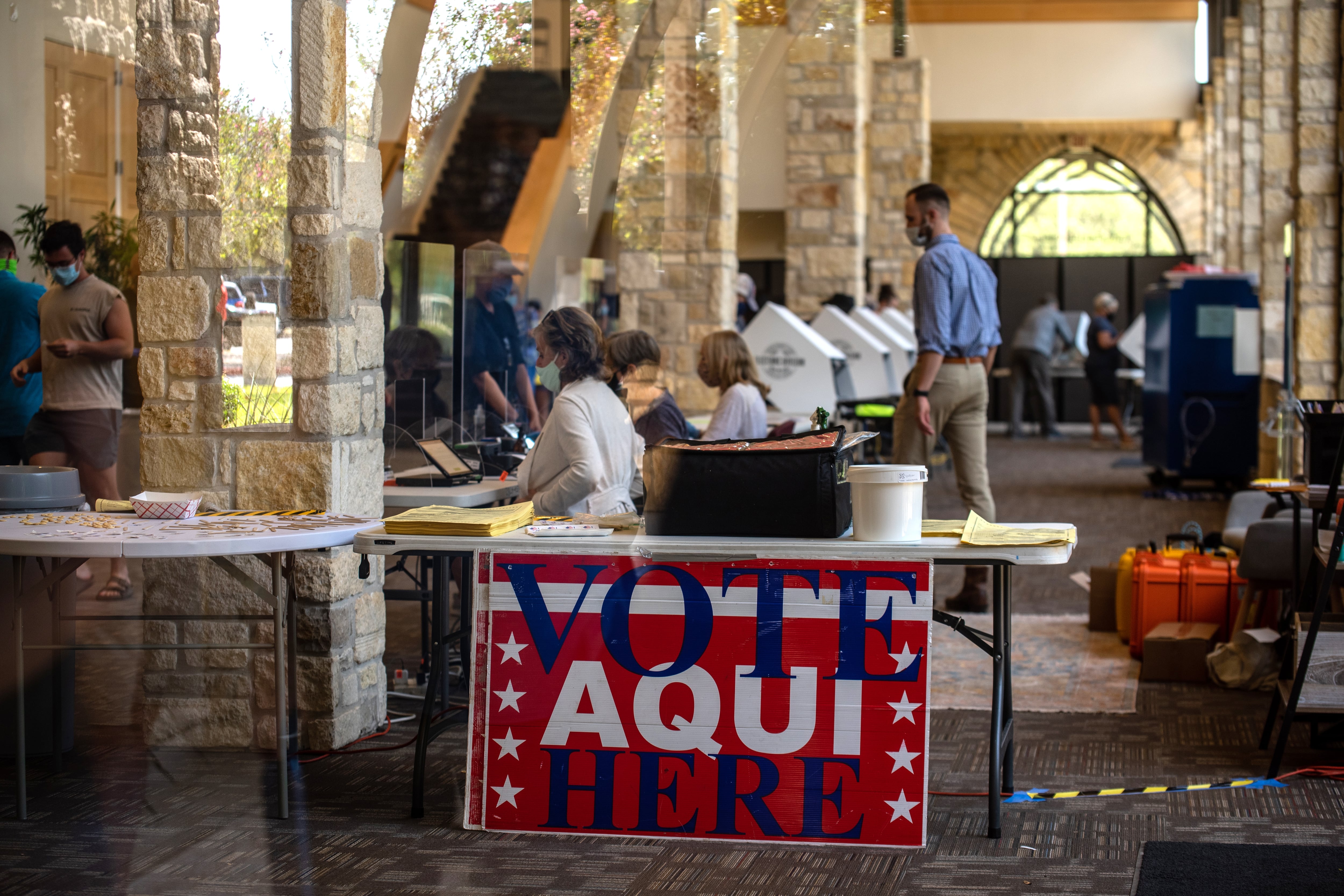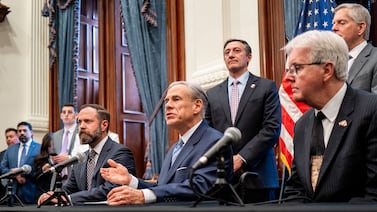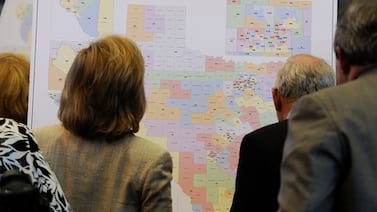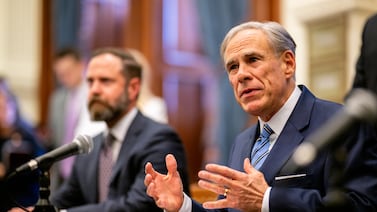HOUSTON — Inside a nearly empty federal courtroom Thursday, a fiery argument broke out between a judge and the lawyers representing Texas-based nonprofit True the Vote in a defamation and computer fraud case filed by a Michigan-based election software company.
U.S. District Judge Kenneth Hoyt warned Houston-based attorneys Brock Akers and Mike Brewer that they might be getting “played” by their conservative nonprofit client after the attorneys repeatedly argued against disclosing the source of the information central to the case, about sensitive poll worker data managed by Konnech Inc.
In podcasts and elsewhere, True the Vote has repeatedly claimed that their organization directed “analysts” to hack Konnech’s servers, which the group claims were located in China and thus proof of the company’s work on behalf of the Chinese Communist Party. After Konnech sued True the Vote last month for defamation, Hoyt ordered True the Vote to turn over any Konnech data the organization still had, and disclose the name of the individuals who’d helped them obtain it.
The contentious tone in the courtroom demonstrated the precarious position the lawsuit has put True the Vote in. The group has spearheaded the spread of voter fraud conspiracy theories in Texas and beyond for years — most recently by producing the debunked voter-fraud documentary “2000 Mules” — and has faced very little accountability for it. Now True the Vote is trying to maintain its conspiratorial claims about Konnech while also denying accusations that it illegally hacked data or misled the public about the company and its CEO.
In their own legal filings, True the Vote said that contrary to their prior public statements, the group had never been in possession of Konnech’s data but had simply been shown it by a source.
Konnech’s lawyers, meanwhile, asked the judge to hold True the Vote’s founder, Catherine Engelbrecht, and a board member, Gregg Phillips, in contempt for failing to follow the judge’s order.
In court Thursday, Akers and Brewer were reluctant to release the source’s name in court, saying they feared for the man’s safety.
Hoyt, a judicial nominee of President Reagan, wasn’t having it.
The judge said he didn’t “have any confidence” in True the Vote’s version of events, in part because he said the group’s leaders haven’t submitted sworn affidavits under penalty of perjury to support them. True the Vote’s lawyers said they didn’t believe their clients needed to appear at the hearing.
“Do errors get made [in elections]? Yeah,” Hoyt said as he continued to question True the Vote’s trustworthiness. “Do people cheat? Perhaps. But all of this hustle and bustle about the integrity of the process? Is the way to fix the process to tear it apart? That’s not integrity.”
He demanded the lawyers release the name of the source.
After nearly two hours of arguing back and forth, Akers followed the judge’s order and looked through a stack of documents in his briefcase, hunting for the name. Once he found it, he wrote it down in a yellow notepad, ripped off the page, walked across the room, and handed it to Konnech’s attorney, Dean Pamphilis. Not satisfied, Pamphilis asked that Akers say the name out loud for the record. After Hoyt instructed him to comply, Akers did so.
Votebeat is not publishing the name. Reporters were unable to independently confirm the named person’s identity or his involvement, and were unable to reach him on Thursday or Friday.
Thursday’s hearing was overshadowed by this week’s unexpected arrest of Konnech CEO Eugene Yu by local police in Michigan, acting on behalf of the Los Angeles County district attorney. The county sought Yu’s extradition to California “as part of an investigation into the possible theft of personal identifying information” of poll workers, according to a press release by the Los Angeles County District Attorney’s office.
Yu was released on bond Thursday, hours before the hearing in Houston, and is expected in court in Los Angeles next week. The Los Angeles County attorney’s office has alleged that the poll worker data was being improperly stored on Chinese servers in violation of the county’s contract with the company, but has not responded to multiple requests by Votebeat to clarify the charges against Yu.
Pamphilis said the California charges were irrelevant to the defamation suit in Texas, and also asserted that his client had been wrongfully arrested.
“Konnech intends to hold accountable in court all of those responsible for the damages caused by their outrageous conduct including the wrongful detention of Mr. Yu while he was enroute to testify in this case,” Pamphilis said in a statement.
Akers and Brewer framed Yu’s arrest as vindication for the group as well as Engelbrecht and Phillips, and as confirmation of the allegations True the Vote had made against Konnech. “Ironically, Plaintiff’s founder and CEO was indicted in Los Angeles County, in coordination with Michigan authorities, and arrested for maintaining sensitive ‘personal identifying information’ on servers in Communist China,” the attorneys wrote in a court filing on Wednesday.
In a statement posted on its website and social media channels, True the Vote claimed credit for Yu’s arrest hours after he was taken into custody.
“True the Vote is honored to have played a small role in what must have been a wide ranging and complex investigation. The organization is profoundly grateful to the Los Angeles District Attorney’s office for their thorough work and rapid action in this matter,” the statement says.
But a spokesperson for the Los Angeles County District Attorney told Votebeat Tuesday that their office had not received any information on the case from True the Vote.
In court, Pamphilis also pushed back against True the Vote’s taking credit for the arrest: “To the extent that they’re going to claim it is relevant, all it does is demonstrate the importance of the data we’re trying to protect and their culpability in having that data in the first place, which they had no right to have.”
Hoyt agreed that Yu’s arrest and the defamation lawsuit were separate issues.
“Some kind of a James Bond kind of thing”
Konnech’s suit cites Phillips’ public claims that he directed analysts to hack the company’s servers and accessed the personal information of nearly 2 million U.S. poll workers allegedly stored in China.
On a podcast titled “Prophets and Patriots,” Phillips described meeting his “guys” at a hotel room in Dallas, where they put “towels under the doors” like “some kind of a James Bond kind of thing,” and hacked into a Konnech server, according to Konnech’s complaint, which included a copy of the podcast as an exhibit.
In legal filings responding to Konnech’s suit, True the Vote denied that Phillips, Engelbrecht, or the group had directly possessed Konnech data, but had viewed data in the possession of someone else. Engelbrecht last month disclosed the person’s name in a sealed filing.
In a later filing, True the Vote said releasing the person’s name would have “significant national security and law enforcement implications.”
True the Vote said in the filings that the source shared the information with Phillips and Engelbrecht, who then turned the information over to the Federal Bureau of Investigation, which was looking into it. But at the hearing, Judge Hoyt questioned True the Vote’s lawyers, Akers and Brewer, about whether they were certain their client’s version of events was truthful.
When Hoyt repeatedly ordered Akers to release the name, Akers pushed back, saying he was concerned for the source’s safety, as well as that of Engelbrecht and Philips. Akers also asked the judge to call the district attorney in California before requiring the lawyers to hand over the name of the source.
Hoyt lost his patience after several minutes and cut him off. He told Akers he would not do that because law enforcement in California were not involved in this lawsuit.
“You know what? That may be an obstruction of justice, what they’ve done,” Hoyt said, apparently referring to True the Vote and its leaders. “We might find that out. On the verge of this proceeding, of this hearing, suddenly the plaintiff gets arrested so he can’t show up in court,” said Hoyt. True the Vote’s lawyers did not respond to that assertion during the hearing.
Eugene Yu’s arrest
According to a news release Tuesday by Los Angeles County District Attorney George Gascón, Yu was arrested as part of an investigation “into the possible theft of personal identifying information” of election poll workers in Los Angeles County. In Michigan, Yu was charged with being a fugitive of justice, a misdemeanor.
Pamphilis told Hoyt Thursday that Konnech has never stored data outside of the United States and referred to a sworn affidavit signed by Yu in the lawsuit.
“It appears to me that Mr. Yu was arrested because of a breach of contract by Konnech, the company that he works for and that he is the president of,” Pamphilis said.
Konnech’s logistics software, dubbed PollChief, is used by counties to hire and schedule poll workers. Los Angeles County’s five-year contract with Konnech stipulates the storage of the data must remain in the United States.
“District Attorney investigators found that in contradiction to the contract, information was stored on servers in the People’s Republic of China,” the news release from the county said, adding that the data in question includes personal information of poll workers and had no connection to the tabulation of votes or election results.
Gascón has yet to release detailed evidence in connection with Yu’s arrest. Votebeat requested a copy of Yu’s arrest affidavit, but the county declined to release the document, citing the ongoing investigation.
The temporary restraining order Hoyt issued against True the Vote last month remains in place, and prevents True the Vote from releasing any of Konnech’s data.
Votebeat asked Akers for comment after the hearing. The attorney closed his eyes, shook his head, mouthed “no” and walked away.
Natalia Contreras is a reporter for Votebeat in partnership with The Texas Tribune. Contact Natalia at ncontreras@votebeat.org.






